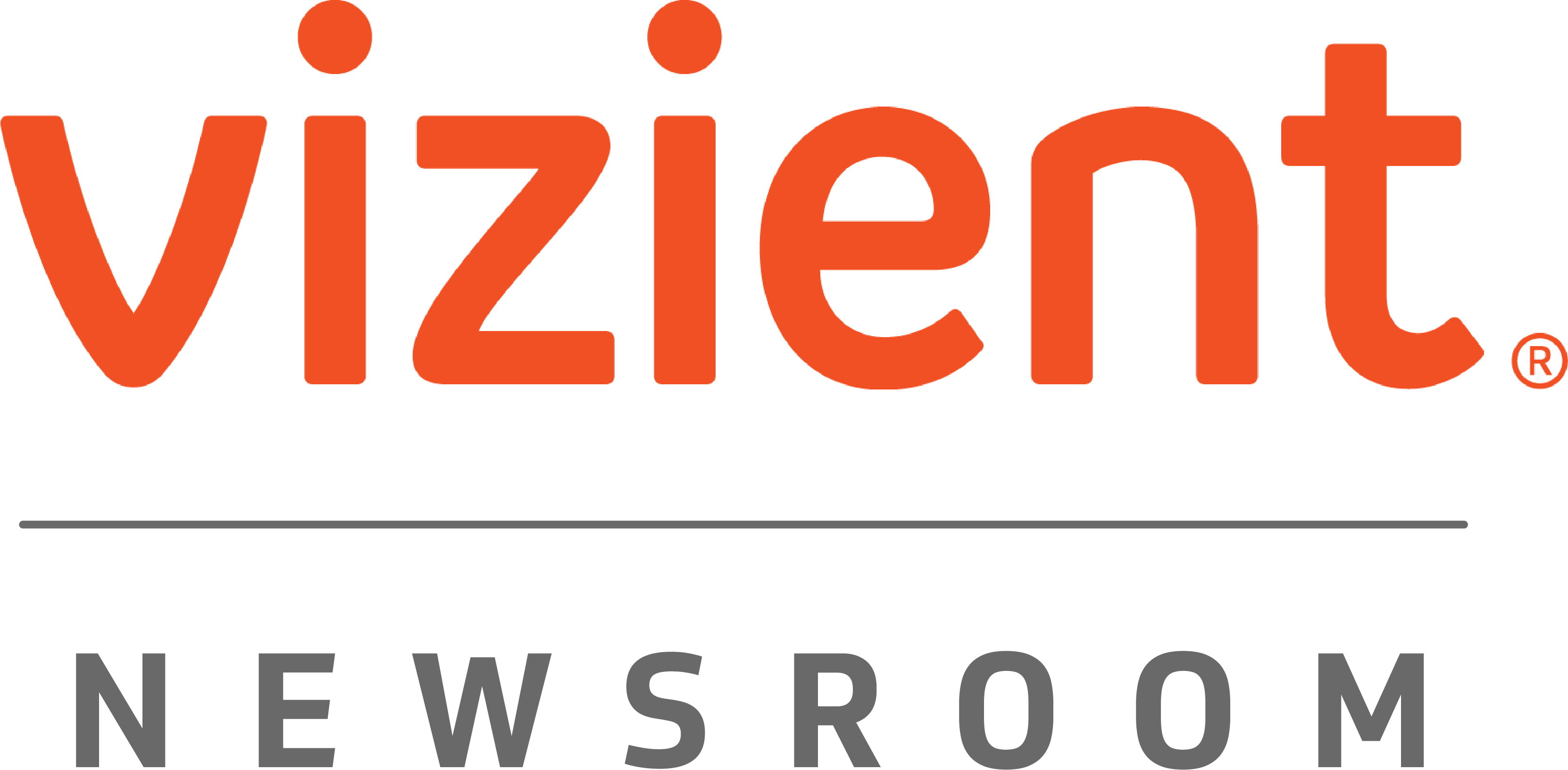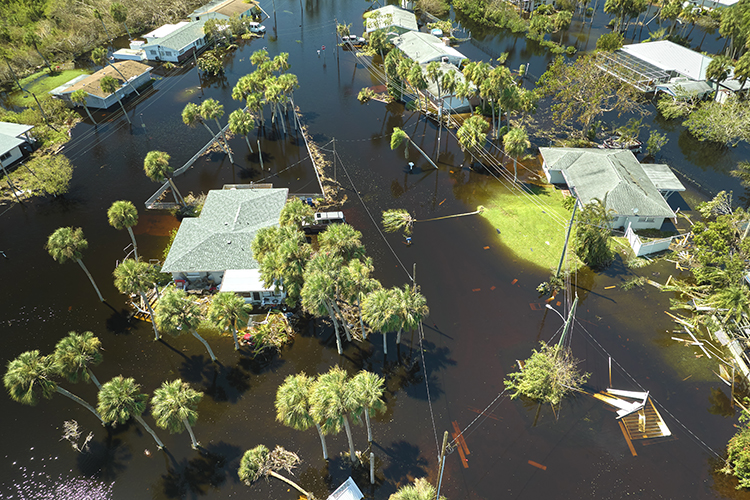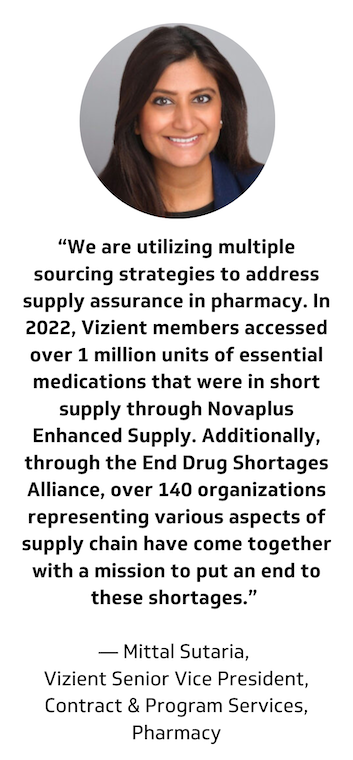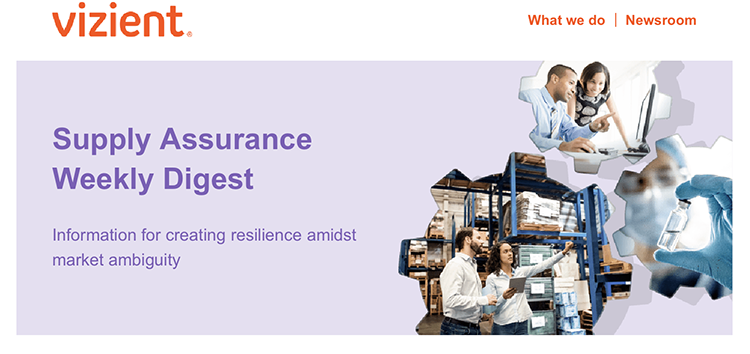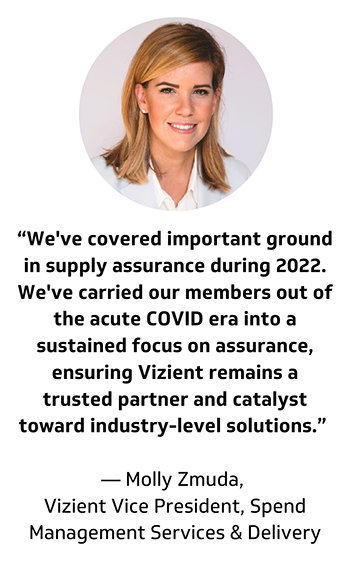by Erin Cristales and Kayla Green
Vizient
If 2020 was unprecedented, then 2022 was unrelenting.
It was, after all, a year that brought Hurricane Ian, mpox, the resurgence of polio and a contrast media shortage — not to mention the Russia/Ukraine conflict, talk of port and rail strikes, severe cases of R.S.V., and destructive droughts, all of which intensified supply constraints and margin pressures.
As relentless as 2022 was, Vizient's approach to supply assurance in the face of these challenges was equally unyielding. The company's commitment to ensuring providers had exactly what they needed to provide the best possible patient care was — according to the experts responsible for tackling the supply challenges of 2022 — "innovative, progressive, supportive and necessary."
Here's a look at a few key lessons that have shaped (and reshaped) the way Vizient works to help its providers make the best of difficult situations — and stand firm in the face of adversity.
COLLABORATE, COLLABORATE, COLLABORATE
When it became clear that Hurricane Ian was likely to blaze a path of destruction across Florida, Vizient experts joined together to help the state's hospitals weather the storm. There were, of course, many moving pieces — from providers to distributors to field staff, everyone on the frontlines faced a barrage of potential perils.
So, behind the scenes, Vizient employees leaped into action. Within 24 hours, they set up a call for Southeast-based providers prior to Ian's landfall that featured 42 panelists and a combination of subject matter experts from Vizient and across the industry. Supply chain and pharmacy representatives joined with operations, clinical and facility experts to provide insights and updates on emergency response, and more than a dozen distributors joined the call in a show of unprecedented solidarity. In the hours after the hurricane hit, the Vizient team helped mobilize many of those same distributors to deliver everything from food to diesel to potable water.
"It sent a powerful message that we are working with our suppliers to support our providers, their caregivers and their patient base," said Chad Mitchell, Vizient AVP, contract and program services. "If we can replicate that over and over again, then we're doing the right thing for healthcare."
The unified approach to Ian wasn't so much new as more nuanced. After all, experts across the company had cut their teeth on the trials and tribulations of COVID-19. At the onset of the pandemic, a 14-person war room emerged, one that would eventually grow to include 65 employees representing every Vizient domain. Then, in January of this year, a dedicated supply assurance team took the reins, adopting a deceptively simple dictum: continue to grow collaboration across the company so that providers and supplier partners can uninterruptedly meet the mission to serve patients.
"Historically, if something big happened, Vizient would stand up a war room," said Kylie Taylor, Vizient senior project manager, supply assurance. "Now, we're not standing up war rooms — we are the war room."
Of course, every war room needs allies, and this year, the pharmacy and supply assurance teams have supercharged their collaborative efforts, joining each other's supplier and distributor calls as well as setting up regular meetings and workflows to ensure providers are covered in every situation.
"Within pharmacy, we've created a collaborative process where when we hear of a product shortage or potential shortage, we immediately notify key stakeholders, including our spend management delivery teams as well as colleagues on the supply assurance team, so that we can spring into action," said James Zotzky, Vizient senior director, contract services. "This way, everyone is made aware of the issue at the same time."
Events like Hurricane Ian, which in late September made its devastating landfall in Florida, required Vizient supply assurance experts to quickly and concisely provide updates to field teams, providers and suppliers.
COMMUNICATE QUICKLY AND EFFICIENTLY
If there was a maxim that came to mind during 2022's crush of crisis situations, it was "Keep it Simple" — particularly in terms of communications.
"Clear, accurate and timely communication is necessary to ensure informed decision-making, effective collaboration and cooperation, public awareness and, most importantly, trust," said Missy Hill, Vizient disaster management director.
From market and natural disaster disruption briefs to executive summaries and material manufacturing briefs, Vizient's expert insights follow the rule of being concise but constructive — something that's particularly important during crisis situations when time is of the essence.
"Emergency managers have two goals: foster collaboration to promote actions and develop awareness of supply chain vulnerabilities and use that information to promote response and recovery planning," Hill said. "Our published communications serve to provide information both in the moment and for future planning."
During Ian, the supply assurance team updated weather disruption briefs twice daily, with associated notifications to the field teams and an accompanying list of potentially impacted providers and suppliers. Additionally, a preliminary call process was initiated for 24/7 support of emergency operations and a disaster phone line was established for future events and with defined procedures for escalation.
"The processes that have been developed this year," said Kevin Johns, Vizient senior director, supply assurance, "allowed Vizient to respond in a cohesive, clear and actionable way to meet the urgent needs of our providers and supplier partners."
For example, in August — when the pharmacy team became aware that a drug used to treat both children and adults with cancer was in short supply — they quickly drew on their own expertise as well as that of their provider base to ensure the medication's availability.
"We decided to pull together a collaboration of children's hospital members across the country to learn more about the shortage, the importance and significance of the product, and how we could help them gain access," Zotzky said. "The immediacy of the communication and collaboration ultimately helped provide a child life-saving access to the product and provided mitigation strategies for other hospitals to implement as part of their patient care practices."
That strategy also was used to immediately address unforeseen issues in 2022 like the mpox (previously called monkeypox) outbreak and reported cases of polio, as well as critical supply shortages such as IV fluids, dialysis solutions and compounding valve sets.
"We have many specialized experts across Vizient who provide resources and guidance for our members," said Kyle Hoelting, senior clinical manager, pharmacy, who leads the member drug shortage mitigation group focused on providing clinical and operational mitigations for shortages and addressing member and sourcing concerns. "We couldn't do that without this collaboration."
TRY NEW THINGS
Early this year, a COVID-19 outbreak once again tore through China, effectively closing Shanghai and causing a major supplier of contrast media – used to improve the diagnostic value of x-rays, CT scans, fluoroscopy and cath lab and interventional procedures – to temporarily shut down operations.
"There isn't any universal department, standardized process or methodology for ordering contrast media, which made the shortage more challenging," said Gretchen Brummel, Vizient pharmacy executive director. "That meant cross-collaboration between supply assurance and pharmacy was especially helpful."
The pharmacy team immediately created mitigation strategies and a supply assurance market brief and sent regular updates through the Pharmacy Hot Info newsletter. But Leah Gannon, Vizient director, contract services, was fielding nearly 500 questions per day and needed to find a better way to send solutions out to the market.
Cue a cross-functional webinar. The pharmacy and supply assurance teams combined expertise to organize a virtual education session that brought suppliers and providers together to talk through the shortage. Following the webinar, a FAQ sheet was sent to all Vizient members.
"It really afforded us the opportunity to be truly transparent," Gannon said. "This was the first time we had set up a webinar like this where providers could be in the same room with suppliers and directly ask questions and learn from each other. It gave the providers some reassurance that the issue would get better, and it provided the suppliers a better understanding of what our members' concerns and pain points were."
Afterward, Gannon and her team added contrast media to the Vizient Essential Medication List, which puts it on target for the Novaplus Enhanced Supply (NES) program. NES provides supply assurance for participating Vizient providers through increased inventory commitment from suppliers.
This year also saw the launch of monthly supply assurance webinars that brought together Vizient staff, providers and suppliers to discuss some of today's toughest supply chain challenges, including the power of partnership and innovative contracting methods. And spend management insights across all domains can be found on the recently launched Vizient Viewpoints, which includes expertise meant to inform performance improvement decisions, drive market growth and help providers stay ahead of industry changes.
"Any time that we can bring intelligence to the fingertips of our provider base, it's a great thing," Mitchell said. "I love the fact that not only are we creating modes and mechanisms to get this information out to our membership, but we're building the infrastructure to ensure it's sustainable."
Vizient's recently launched Supply Assurance Weekly Digest compiles the most essential supply chain news into an email sent out each Friday.
LISTEN TO YOUR STAKEHOLDERS
At one point in early summer, a provider reached out to the supply assurance team to ask for a weekly emailed compilation of the many resources posted to Vizient's supply assurance site. Since the inception of the Supply Assurance Weekly Digest in August, the one-stop shop has soared in popularity — and has provided easy-to-digest insights on everything from food and drug shortages to margin pressures and market disruptions.
"Along with providing all of this content, we're making sure each piece of content has a call to action," Taylor said. "And the links never change, so our providers are always going to see the most up-to-date information. They don't have to sort through a bunch of information to find the most important, relevant news — we do that for them."
This year's many challenges — along with those experienced throughout the COVID-19 pandemic — also mean providers are looking to diversify their supply chain through domestically manufactured products. In response, Vizient Domestic Sourcing launched this spring, and includes two distinctions within the catalog: 1) products meet Vizient's "Assembled in USA" standard, which states that the final place of manufacturing is within the U.S. and 2) they comply with the Federal Trade Commission's "Made in USA" standard, meaning that all or virtually all of the product has been made in the U.S.
"Providers are searching for supply assurance to perform critical healthcare operations and are turning to Vizient as a trusted partner to provide bold, domestic solutions to help diversify their supply chains," said Cristina Indiveri, Vizient AVP, strategic programs and contract services. "They are requesting domestic products to not only meet their short-term resource needs but also ensure a resilient and sustainable supply chain in the years to come."
Reaching out to stakeholders ultimately makes all the difference in a crisis, particularly when it comes to determining where efforts should be focused.
"We want to make sure that products are distributed evenly across the country and that every member has their fair shot of getting a product, whether they're a small rural hospital in the middle of Montana or a large hospital in New York City," Zotzky said. "We also try to help distributors understand where product is needed and who needs it at any given time."
Stacy Lauderdale, Vizient senior director, drug information, said the best information always comes from those who are in the thick of it.
"You never know what's going on until you talk to the pharmacists on the ground," she said. "That's why our enhanced collaboration and all we've accomplished within both pharmacy and supply assurance has, and always will, prioritize the voice of the provider."
BE FLEXIBLE
Of course, the reality is there's no perfect way to predict, or even prepare for, the next crisis. It might be an international conflict, unforeseen labor shortages or natural disasters striking within days of each other. Ultimately, every situation brings unique challenges — and new avenues to be better, stronger and more adaptable.
"The plans that are in place bring comfort and the initial boundaries on how to respond," Hill said. "Then, as an organization we say, 'What do we still need to do, what do we throw out and what should we add?' A crisis helps to smooth those rough edges and identify vulnerabilities, whether it's in practice or in supply, whether it's at the C-suite level or ground level. We analyze the whole situation so we can go back to providers and say, 'We're here for you — and we're always learning and evolving to address whatever problem you have.'"
